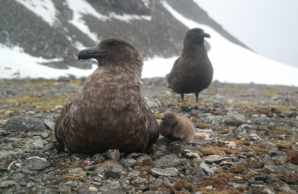Never Forget a Face
Brown skuas can recognize individual humans.

Brown skua parents remember and attack humans who have intruded on their nests.
Certain bird species, including crows and magpies, have been shown to recognize individual humans. This ability could result from the birds’ generally high cognitive capacity, or from extended experience living among humans. A new study has distinguished between these possibilities by investigating the brown skua (Stercorarius antarcticus), an Antarctic seabird that lives in harsh polar climates where few humans dare venture.
A team of researchers led by ecologist Won Young Lee of the Korea Polar Research Institute were studying the breeding habits of brown skuas in the Antarctic Peninsula when they noticed that the skuas behaved antagonistically towards people who repeatedly visited their nest sites. At a first visit, skua parents waited until researchers were 5-15 meters from their nest before responding mildly. By the fourth visit, skua parents started responding sooner, when researchers were 10-25 meters from the nest, and often physically attacked the intruding researchers. One male skua even took to flying off with a researcher’s hat an d dropping it at a distance, forcing the researcher to walk away.
These aggressive acts suggested that skuas were recognizing their human trespassers. Lee and colleagues conducted an experiment to test whether this was the case. Pairs of identically dressed researchers—one who had previously visited a nest three times and one who had never before visited—walked up to skua nests together, and then walked away in opposite directions.
All seven tested pairs of skua parents ignored the new person. Instead, they chose to follow and behave aggressively towards the repeat visitor, thus indicating that they were able to recognize individual humans.
Because brown skuas have only been exposed to humans in the last few decades, it is unlikely that their ability to recognize humans is an evolved adaptation. Therefore, brown skuas’ human recognition likely results from high cognitive abilities. Lee plans to follow up on this research to determine how long skuas can remember the identities of human intruders, as well as whether the presence of humans in Antarctica has altered skuas’ behavior in other ways. (Animal Cognition)